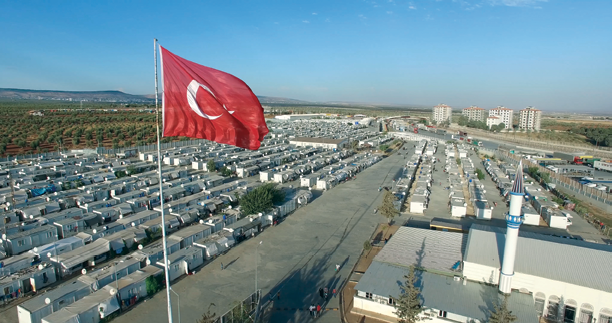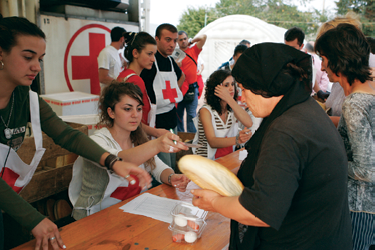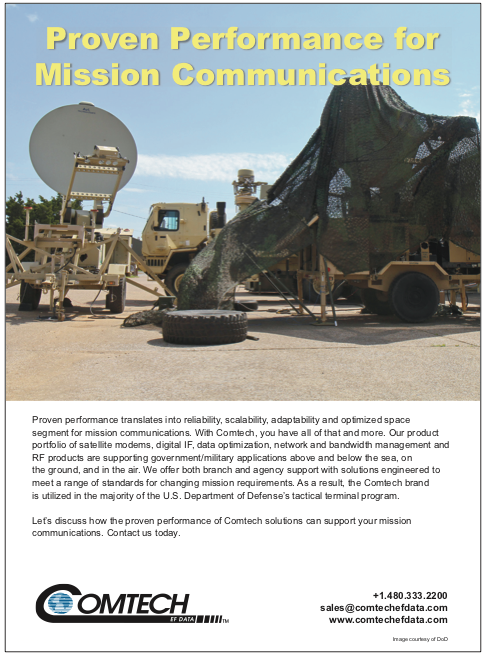Displaced, disorientated, on the brink of death — when faced with a humanitarian crisis, many of us would be unable to cope with the magnitude of the operational tasks needed to help when disaster strikes.
Not so for the world’s international aid agencies who leap into action and put into place their well-established plans and procedures.
IEC Telecom’s satellite communication solutions are at the heart of these activities. Thanks to the company’s 24-hour service and globally responsive capabilities, IEC Telecom can activate hundreds of satellite phone SIM cards within two hours, while urgently dispatching stocks of handsets, modems and hardware to aid agency teams loading planes ready to fly out to disaster zones.

Pictured below is the Akcakale Tent Camp in southeastern Turkey. Approximately 28.000 Syrian people reside in Akcakale Tent Camp in Urfa.Syrians has started to take refuge in Turkey in April 2011. The first camp was established in Yayladağı-Hatay on May 1, 2015.
Satellite communications (SATCOM) are a central necessity for disaster management strategies, helping aid workers in the field to communicate as they establish the infrastructure needed to undertake recovery operations, rescue hundreds of victims or accommodate thousands of refugees.
This is a logistically challenging and exhausting, but ultimately fulfilling, role. “We are proud to work with many international aid agencies, NGOs and governmental organizations throughout the world,” said Gwenael Loheac, Managing Director of IEC Telecom. “We understand that they are working in difficult conditions, we know how hard they work and the levels they go to in order to help devastated people, and we believe we are privileged to be part of this global sector. It’s a special business to be able to help people who are undergoing very difficult situations in hostile conditions.
Using IEC Telecoms solutions, aid workers are able to establish offices in the field, however remote or challenging their location may be. Using the best SATCOM solutions available enables those field locations to operate at levels on a par with regular offices, meaning data can be transferred at high speed allowing for real-time conversations and discussions.
Large bandwidth facilities, which IEC Telecom provides via L-band modem services using all the leading satellite provisions from companies such as Inmarsat, Iridium and Thuraya or VSAT super modem services using C-, Ku- or Ka-band, allow for the transfer of data and communication via email, telephone, social media platforms, etc.
High speed file transfer including large file formats such as video footage allows for services such as telemedicine to be used in actual time, helping to save more lives.
Field operations are supported by IEC Telecom’s 24/7 global technical helpline services which are available all year round. Following competitive tendering processes, the company provides its services on an optimization system, ensuring high levels of provisioning for its customers.
Careful registration of allocated SIM cards means that activation can be achieved at the click of a button in rapid time — sometimes as quickly as 10 minutes — and in large volume when needed.
Need is growing, as well — as data capabilities increase, so does the range of uses for SATCOM. “Ten years ago the majority of business was mostly voice calls,” explained Mr Loheac, “Today, data transmission accounts for the biggest use and we see this growing at a fast rate.”
It’s not just aid workers who can benefit from telecommunications provision —– millions of refugees around the world are able to stay in touch with the outside world using satellite phones — often using a voucher system to access airtime.
In many parts of the world, there are long-established refugee camps which are the size of small cities. The average sized camp houses more than 11,400 people. With the average stay amounting to around 15 years, many youngsters are born and raised in refugee camps. Satellite communications benefit education by enabling online e-learning tools to be used or providing access to broadcast learning resources.
The United Nations refugee Agency (UNHCR) reports that the world is witnessing the highest levels of displacement on record. An unprecedented 68.5 million people around the world have been forced from home, among them nearly 25.4 million refugees, more than half of whom are under the age of 18.
Mr. Loheac noted, “A refugee camp is in many senses an artificial environment. Satellite communications can provide a window to a wider world, enabling access to social media, online resources and communication with friends and family.”

As the need for satellite communications grows within the humanitarian sector, IEC Telecom is at the forefront of progress. Having its own in-house engineering team, IEC Telecom is able to develop innovative solutions, both to meet customer’s unique requirements and to anticipate future demands.
For example, IEC Telecom recently signed an agreement with Iridium to become a commercial partner to supply the MissionLINK™ by Thales — a state-of-the-art product which enables instant and critical operation global communications coverage regardless of the landscape – particularly valuable in remote areas.
MissionLINK meets unique challenges through a simple, adaptable and robust design which comes with an intuitive, user-friendly interface and can be quickly integrated into vehicles. Also included is a built-in upgradeability to extend the life of this investment and to ensure peak speed and performance.
IEC Telecom Group has been providing communications solutions to aid workers for more than 20 years. The company offers a broad range of products and humanitarian solutions that are highly suited to the emergency phase following any disaster or crisis: satellite phones, mobile devices to deploy WiFi connectivity / “Bring Your Own Device” or portable and fixed modems.
Instant communications in the field are achieved thanks to lightweight and compact equipment, providing workers with enhanced mobility and shorter reaction times during a crisis first response phase.
Once the disaster recovery phase is entered, IEC’s telecommunications systems assist aid agencies to consolidate their relief efforts over time, establishing temporary offices using semi-fixed modems such as Inmarsat BGAN range or Thuraya IP+ to enable them to access corporate applications, manage logistics or even use low bandwidth videoconferencing solutions.
Multiple team members can share the same WiFi connection, establish a temporary office as well as benefit from prepaid vouchers for voice communications to stay in touch with their friends and family while being in the field.
For longer term deployments and sustainable development missions, IEC Telecom Group can meet any specific needs and offers high broadband data connectivity for teams to access and share high data volume, get a Virtual Private Network connection, join videoconferencing, etc.
The company offers VSAT services (Ku- and Ka-bands), mobile, fixed or vehicular equipment and a large choice of options to provide the best solutions based on a team’s specific requirements and constraints. All equipment is made to last and designed to resist the hardest climatic conditions, to maximize performance and long-term durability.
Rescue environments and refugee camps can be hazardous locations. To ensure personal safety, IEC Telecom offers advanced tracking solutions that allow a complete view of the positioned, front-line staff in real-time.
Gwenael Loheac pointed out, “Every disaster is different. We provide adaptable, flexible and targeted solutions to enable humanitarian teams to use the latest satellite communication technology wherever they are in the world. We are proud of our customer-focused approach which, backed up by our twenty four hour global helpline, means we can guarantee high levels
of satisfaction.

“When you are saving lives the last thing you want to be worrying about is your communications network – that’s our job.”
Gwenael Loheac is Group COO – Europe and Managing Director of satellite communications specialist IEC Telecom and is based at the company’s office in Cergy, France. Gwenael has a strong background in the satellite industry and specializes in purchasing processes and vertical applications. Having joined IEC Telecom in 1997, he now leads business development for the group in the Americas, West Africa and Europe.


